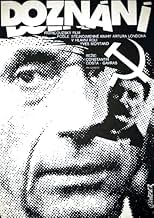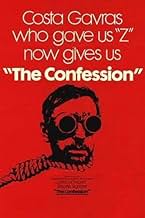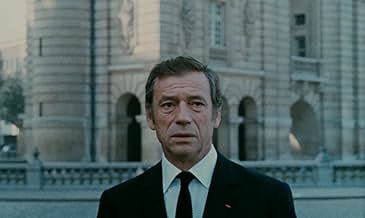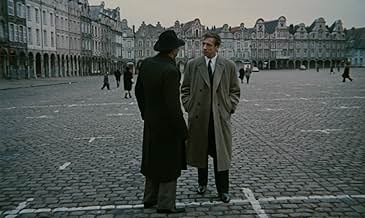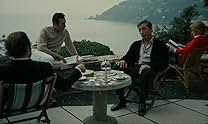IMDb RATING
7.8/10
5.2K
YOUR RATING
A high-ranking official is forced to confess to high treason.A high-ranking official is forced to confess to high treason.A high-ranking official is forced to confess to high treason.
- Nominated for 1 BAFTA Award
- 3 wins & 3 nominations total
Featured reviews
"The Confession" is an uber-bleak film that stars Yves Montand as a loyal member of the Communist party who is turned on and made a scapegoat of when the party becomes paranoid about informers. He is imprisoned and systematically tortured until he admits to crimes against the party he didn't actually commit. Simone Signoret has a much smaller role as his wife, who sees her home invaded by Communist party thugs during the time in which her husband is in prison.
"The Confession" I think provides a good illustration of the pitfalls of Communism, which, despite its merits on paper, rarely works as an actual system. Those who adhere to it feel too persecuted to remain secure for long, and they turn against each other, convinced of double crossings and disloyalty to the party. It reminded me very much of the excellent novel "Darkness at Noon," which similarly examines the ways in which Communism eventually falls apart in practice.
I can't say I necessarily enjoyed "The Confession." It's extremely one-note; the film doesn't really have much of a dramatic arc. It's not able to marry the qualities of political expose and thriller the way another of director Costa-Gavras's classics, "Z," is. But I would still recommend it.
Grade: B+
"The Confession" I think provides a good illustration of the pitfalls of Communism, which, despite its merits on paper, rarely works as an actual system. Those who adhere to it feel too persecuted to remain secure for long, and they turn against each other, convinced of double crossings and disloyalty to the party. It reminded me very much of the excellent novel "Darkness at Noon," which similarly examines the ways in which Communism eventually falls apart in practice.
I can't say I necessarily enjoyed "The Confession." It's extremely one-note; the film doesn't really have much of a dramatic arc. It's not able to marry the qualities of political expose and thriller the way another of director Costa-Gavras's classics, "Z," is. But I would still recommend it.
Grade: B+
I got dragged into this movie like the protagonist got dragged into the brutal, endless interrogation. Given the overall vapidity of most of today's films, this is a real diversion into the power that really lies beneath the surface of movies, the acting, the writing, directing, and most important the mood. The mood of this film drags you like it does the character played by Yves Montand, as he endures a two year interrogation by the people's republic. It's real historic as well, full of details about Titoists, Trotskyites, and anarchists and paranoia over the struggle to control the communist revolution. But Montand looks great as he endures an impressive variety of interrogation techniques.
Came across this excellent film tonight on the Turner Classic Movie channel. I won't rehash the film story here, it has been explained quite well by previous reviewers.
Want only to state that I first saw it when it was released back in 1970-71. I was a very young soldier then. The Vietnam war was still raging and the cold war with the Soviets and Warsaw Pact nations was very real. The Soviet invasion of Czechoslovakia in 1968 was still fresh in our minds.
Even though it is not entirely an anti-communist film, rather an honest look of what can and did go horribly wrong in soviet bloc countries, it was a chilling reminder to us of how frightening life could be in a totalitarian state.
Released here in the U.S. during a time of continued civil unrest and anti-war sentiment carried over from the late '60's, it was sort of a reality check to the growing affection for the left wing, socialist philosophy etc. among the younger generation.
Want only to state that I first saw it when it was released back in 1970-71. I was a very young soldier then. The Vietnam war was still raging and the cold war with the Soviets and Warsaw Pact nations was very real. The Soviet invasion of Czechoslovakia in 1968 was still fresh in our minds.
Even though it is not entirely an anti-communist film, rather an honest look of what can and did go horribly wrong in soviet bloc countries, it was a chilling reminder to us of how frightening life could be in a totalitarian state.
Released here in the U.S. during a time of continued civil unrest and anti-war sentiment carried over from the late '60's, it was sort of a reality check to the growing affection for the left wing, socialist philosophy etc. among the younger generation.
I saw this film last night and it has being going around in my head all day. It builds with a slow intensity which becomes absolutely compulsive. In style it reminded me a lot of The Godfather films. Calm, matter of fact but intensively observed portrayals of almost unbelievably hideous events. It has the same effect - if you stop to watch for just a few seconds, you are irresistibly drawn into the stream of events. Yves Montand is at his down beat best. What struck me most is that this true story of the post-way purges in the USSR's East European client states is of a time and place almost inconceivable to most of us now. The blind belief in The Party, the Inquisition-like mind games of the interrogators that convince the accused that to demonstrate their true loyalty to the Party, they must confess to the most ridiculous accusations of their betrayal of it. And I was surprised to see that it was made in 1971, the feel is absolutely contemporary, even though it depicts such far off events. While I was watching, I was convinced that I knew the story - isn't this the same as Koestler's 'Darkness at Noon'?
Anton Ludvik aka Gerard (Yves Montand) is the vice-minister of Foreign Affairs of Czechoslovakia. He is worried that he's being followed. Other officials are being picked up in a purge. He gets picked up by a dark militaristic organization. His family is harassed. His wife Londonova (Simone Signoret) struggles in her new circumstances. He is psychologically tortured to give false confessions.
This is basically two hours of movie confinement with his jailers doing all kinds of psychological warfare. At times, I feel like being tortured myself. There's good and bad in that. It doesn't make for a pleasant or necessarily a compelling viewing experience. It's more of a compelling academic exercise. This is the cinematic equivalent of stress position. The acting is impeccable and the production is first rate. It's Kafkaesque and a cry against totalitarianism.
This is basically two hours of movie confinement with his jailers doing all kinds of psychological warfare. At times, I feel like being tortured myself. There's good and bad in that. It doesn't make for a pleasant or necessarily a compelling viewing experience. It's more of a compelling academic exercise. This is the cinematic equivalent of stress position. The acting is impeccable and the production is first rate. It's Kafkaesque and a cry against totalitarianism.
Did you know
- TriviaThe film was restored in 2014 by KG Productions with the support of the CNC under the supervision of Costa-Gavras by Éclair Group for the image and L.E. Diapason for the sound.
- ConnectionsEdited into The Last Bolshevik (1993)
- SoundtracksL'Aveu (Générique)
Written by Giovanni Fusco
- How long is The Confession?Powered by Alexa
Details
- Release date
- Countries of origin
- Languages
- Also known as
- Das Geständnis
- Filming locations
- Grand Place, Arras, Pas-de-Calais, France(London seeing Kahoutek for the last time)
- Production companies
- See more company credits at IMDbPro
Box office
- Gross US & Canada
- $329,954
Contribute to this page
Suggest an edit or add missing content

